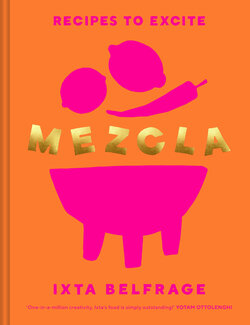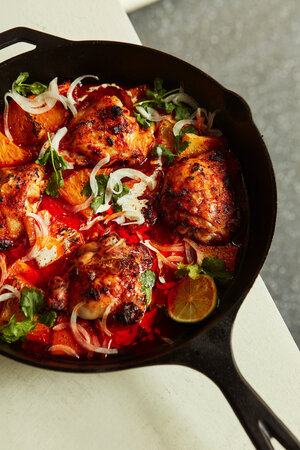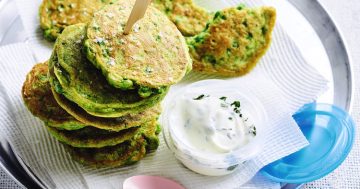By Christine Salins.
 Before we get into this week’s book, Mezcla, it needs to be said that the title should not be confused with the drink mezcal.
Before we get into this week’s book, Mezcla, it needs to be said that the title should not be confused with the drink mezcal.
Mezcla is a Spanish word meaning ‘mix’, ‘mixture’, ‘blend’ or ‘fusion’. It’s a beautiful word that the author Ixta Belfrage says has meaning in food and cooking, and also in music and art.
Mezcla, published by Ebury Press (RRP $55), draws on her life spent exploring and enjoying food in Italy, Mexico, and Brazil. The Yotam Ottolenghi protégé co-authored her first book, Flavour, with Ottolenghi but in this latest book, her first solo effort, she shares her own favourite mezcla of flavours.
Belfrage spent time in the kitchen and was exposed to a variety of cultures and cuisines from a young age, but began her culinary career proper at Ottolenghi’s NOPI restaurant, before moving to Ottolenghi’s Test Kitchen.
Living in London, she makes regular guest chef appearances in some of London’s top restaurants and contributes to newspaper columns where her recipes are prized for their foolproof techniques and inventive ingredient combinations.
That follows through to the recipes in Mezcla, which are fuss-free but bursting with fusion flavours, perfect for both everyday dining and for entertaining.
Some are quick dishes with inspired combinations, such as Chilli Roasted Oyster Mushroom Skewers and Giant Cheese on Toast with Urfa Butter, while others are dishes to spend more time on, such as Whole Roast Chicken Curry with Crispy Curry Leaves, and a decadent Prawn Lasagne with Habanero Oil.
Belfrage loves the combination of sweet and savoury and thinks there is no greater union than that of pork and pineapple. The pork in the recipe here comes in the form of ’nduja,
a spreadable chilli-spiked sausage from Calabria. Add chicken, pineapple, chipotle and tangerine to the mix and you’ve got yourself a mezcla party.
 Chicken, pineapple and ’nduja bake
Chicken, pineapple and ’nduja bake
Serves 4
4 skin-on, bone-in chicken thighs, at room temperature
4 cloves of garlic, peeled and crushed with the side of a knife
1 medium onion, halved and very thinly sliced on a mandolin
½ large, extra-ripe pineapple, peeled (300g)
4 sweet tangerines (or 2 oranges), squeezed to get 100g juice (see notes)
100g chicken bone broth, stock or water
2 tablespoons double cream
5g fresh coriander
1 lime, cut into wedges
’Nduja and chipotle paste:
50g ’nduja paste/spread
2 tablespoons olive oil
2 teaspoons tomato purée/paste
½ teaspoon chipotle flakes
½ teaspoon paprika
¾ teaspoon fine salt
about 20 twists of freshly ground black pepper
Preheat the oven to 180°C fan/200°C.
Put all the ingredients for the paste into a large bowl and mix together. Add the chicken, garlic and three-quarters of the sliced onion and mix well so everything is coated evenly. Tip the onions and garlic into a 28cm ovenproof cast-iron skillet or similar-sized baking dish and spread out. Place the chicken thighs on top, skin side up and spaced apart.
Cut the pineapple into 4 rounds, then cut each round into quarters, removing the hard core (you should have about 300g). Add the pineapple to the bowl with the remnants of the paste, mix to coat with whatever’s left there, then arrange the pineapple around the chicken.
Pour the tangerine juice around the chicken (don’t get the skin wet), then bake for 20 minutes. Remove from the oven and pour the stock or water into the
pan around the chicken (again, don’t get the skin wet). Return to the oven for another 20 to 25 minutes, or until the chicken is cooked through and the skin is browned and crispy. If you have a blowtorch, use it to char the pineapple a little.
Drizzle the cream into the sauce. Toss the coriander and the remaining sliced onions together with a tiny bit of oil and salt and arrange on top. Serve from the pan, with the lime wedges alongside.
Get ahead: Marinate the chicken in the ’nduja and chipotle paste up to 2 days ahead, but don’t mix in the onion and garlic until you’re ready to bake.
Notes: The author uses tangerines over oranges as they have a more complex, floral flavour, but feel free to use oranges if that’s easier (use fresh fruit, though, not juice from a bottle or carton). If your tangerines/oranges aren’t particularly sweet, you may want to add some maple syrup or honey – do this when you add the stock or water.
Recipe and image from Mezcla, by Ixta Belfrage, published by Ebury Press (RRP $55).




